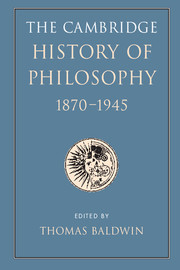Book contents
- Frontmatter
- Contents
- List of contributors
- Introduction
- I 1870–1914
- II 1914–1945
- 8 Logic and philosophy: the analytic programme
- 28 Logical atomism
- 29 The scientific world conception: logical positivism
- 30 The achievements of the Polish school of logic
- 31 Logic and philosophical analysis
- 9 The diversity of philosophy
- 10 Knowledge, language, and the end of metaphysics
- 11 Philosophy and the exact sciences
- 12 Mind and its place in nature
- 13 Philosophy and social science
- 14 Ethics, religion, and the arts
- 15 Law and politics
- Biobibliographical appendix
- Bibliography
- INDEX
- References
31 - Logic and philosophical analysis
from 8 - Logic and philosophy: the analytic programme
Published online by Cambridge University Press: 28 March 2008
- Frontmatter
- Contents
- List of contributors
- Introduction
- I 1870–1914
- II 1914–1945
- 8 Logic and philosophy: the analytic programme
- 28 Logical atomism
- 29 The scientific world conception: logical positivism
- 30 The achievements of the Polish school of logic
- 31 Logic and philosophical analysis
- 9 The diversity of philosophy
- 10 Knowledge, language, and the end of metaphysics
- 11 Philosophy and the exact sciences
- 12 Mind and its place in nature
- 13 Philosophy and social science
- 14 Ethics, religion, and the arts
- 15 Law and politics
- Biobibliographical appendix
- Bibliography
- INDEX
- References
Summary
As we look back to the philosophy of the period from 1914 to 1945, we tend to think of this as a time when ‘analytic philosophy’ flourished, though of course many other types of philosophy also flourished at this time (idealism, phenomenology, pragmatism, etc.). But what was this ‘analytic philosophy’ of which John Wisdom wrote when he opened his book Problems of Mind and Matter (1934) by saying ‘It is to analytic philosophy that this book is intended to be introduction’ (1934: 1)? Wisdom makes a start at answering this question by contrasting analytic philosophy with ‘speculative’ philosophy: the contrast is that speculative philosophy aims to provide new information (for example, by proving the existence of God), whereas analytic philosophy aims only to provide clearer knowledge of facts already known. Much the same contrast is to be found in the ‘statement of policy’ which opens the first issue of the journal Analysis in 1933: papers to be published will be concerned ‘with the elucidation or explanation of facts…the general nature of which is, by common consent, already known; rather than with attempts to establish new kinds of fact about the world’ (Vol. I: 1). As we shall see, the thesis that philosophy does not aim to provide new knowledge is indeed a central theme of many ‘analytic’ philosophers of this period. But first we need to investigate the relevant conception of analysis – ‘philosophical’ analysis.
- Type
- Chapter
- Information
- The Cambridge History of Philosophy 1870–1945 , pp. 417 - 424Publisher: Cambridge University PressPrint publication year: 2003



